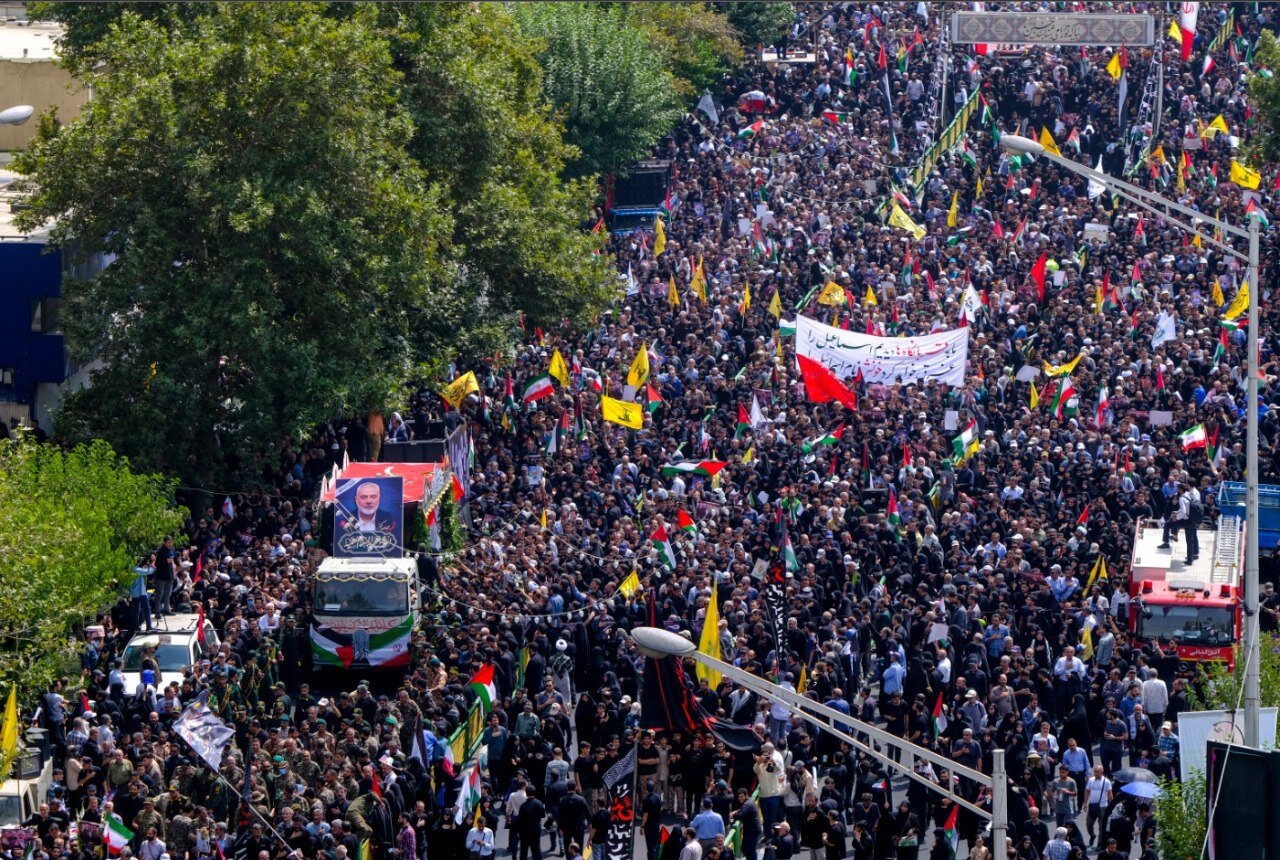Day of reckoning looms large

TEHRAN – Multiple Iranian officials have emphasized the Leader of the Islamic Revolution’s vow of retaliation against Israel for the assassination of Hamas Political Chief Ismail Haniyeh in Tehran.
Haniyeh was assassinated in the early hours of Wednesday when a projectile hit his temporary residence in northern Tehran, according to a statement by the Islamic Revolution Guard Corps (IRGC). The head of the political bureau of Hamas had traveled to Iran to attend President Masoud Pezeshkian’s inauguration ceremony.
Ayatollah Seyyed Ali Khamenei, who led the funeral prayer over Haniyeh’s body before it was transferred to Qatar on Thursday, has vowed to avenge the blood of Iran’s “dear guest.” “The criminal and terrorist Zionist regime martyred our dear guest in our homeland and left us bereaved, but it also set the ground for a harsh punishment for itself,” the Leader said in a statement released hours after Haniyeh was assassinated.
The first high-ranking Iranian official to repeat the Leader’s vow was Parliament Speaker Mohammad Baqer Qalibaf, a powerful figure in Iran’s political system believed to be close to the country’s armed forces.
"We will definitely act on the Leader's command to respond to the crime at the right time and place," the parliament speaker affirmed during Haniyeh’s funeral ceremony held on Thursday, adding that the Israeli regime will pay a “heavy price” for its cowardly act.
Qalibaf also pointed the finger of blame at Washington, stating: “No Israeli crime ever takes place without direct U.S. coordination.”
Analysts believe that Washington gave the greenlight for the assassination of Haniyeh during Israeli Prime Minister Benjamin Netanyahu's recent trip to the U.S., a visit that included his controversial address to Congress.
Iran’s most senior military official, Chief of Staff of the Iranian Armed Forces Major General Mohammad Hossein Baqeri, has also vowed a harsh response for Israel. "The way the Axis of Resistance and we will seek justice for the martyrdom of Haniyeh is under review. Various actions must be taken, and the Zionists will undoubtedly regret it," Major General Baqeri said on the sidelines of the funeral ceremony for Martyr Ismail Haniyeh. "This will definitely happen. Various actions must be taken, and the Zionists will certainly regret it," he emphasized.
Major General Abdolrahim Mousavi, the Iranian Army chief commander, and Major General Hossein Salami, the IRGC commander-in-chief, were among the other high-ranking military officials who reiterated Tehran’s resolute will for retaliation.
On Friday, a day after the remarks by the military leaders, a member of the Leader of the Islamic Revolution’s office said Iran had concluded how it was going to avenge Haniyeh’s blood. “It will be conducted shortly if God wills it,” Mehdi Fazaeli announced.
The nature of Iran's response to the Hamas official's assassination remains uncertain. Some speculate that it could exceed the scale of Iran's response to the Israeli strike on its embassy in Damascus, which involved the launch of numerous drones and missiles into the occupied territories in April.
"I don't think Iran's retaliation would include the same assassination tactics Israel has been using for years," Mehdi Bakhtiari, a war reporter and expert on West Asia, told the Tehran Times. "I predict Iran will do something similar to what it did during Operation True Promise on April 14, but the response would be harsher and more destructive. That's because, in April, we merely aimed to showcase our capabilities and did not want to deal severe damage to the regime," he added.
Bakhtiari explained that the regime’s assassination of a top Hezbollah figure hours before the killing of Haniyeh, and its earlier strike on Yemen’s Hodeidah port, means a coordinated response against Israel from multiple fronts may be imminent. “Lebanon’s Hezbollah, Yemen’s Ansarullah, and even Resistance forces in Syria and Iraq might join Iran in its retaliation. Also, I don’t think American or other Western forces are going to be targeted.”
Recent remarks and discussions by Israeli officials show that the regime is also expecting a robust response. War Minister Yoav Gallant, in a conversation with his British counterpart on Friday, emphasized the need for a "coalition" of allies to defend Israel against potential attacks from the Axis of Resistance, similar to how some Western and Arab countries helped intercept Iranian drones and missiles on April 14.
Is the region teetering on the edge of an all-out war?
By assassinating a key figure from the other side of the negotiating table, Netanyahu has demonstrated that ending the war in Gaza is not his top priority. Furthermore, given Iran's inevitable response to Haniyeh's assassination, his actions suggest an intentional desire to draw the U.S. into a regional conflict with Tehran and the Axis of Resistance.
This has caused observers around the world to have growing concerns about the prospects of the escalating situation erupting into an all-out war with severe and long-lasting consequences. Many analysts, however, believe that while Joe Biden and his top accomplices like Antony Blinken have easily been manipulated by Netanyahu in the past 10 months, they are still wise enough to avoid a regional conflict in their current state.
"Iran has been dealing with Netanyahu for several years. It will not walk into his trap. Our response would be firm, but it wouldn't be conducted in a manner that would give Washington the reason to enter a war with us," an expert quoted by Nournews, an agency believed to be close to Iran's National Security Council, stated. "The U.S. is also not looking for a new war in West Asia. It is already bogged down in Ukraine and needs to focus its resources on tackling significantly bigger threats like China."
Leave a Comment